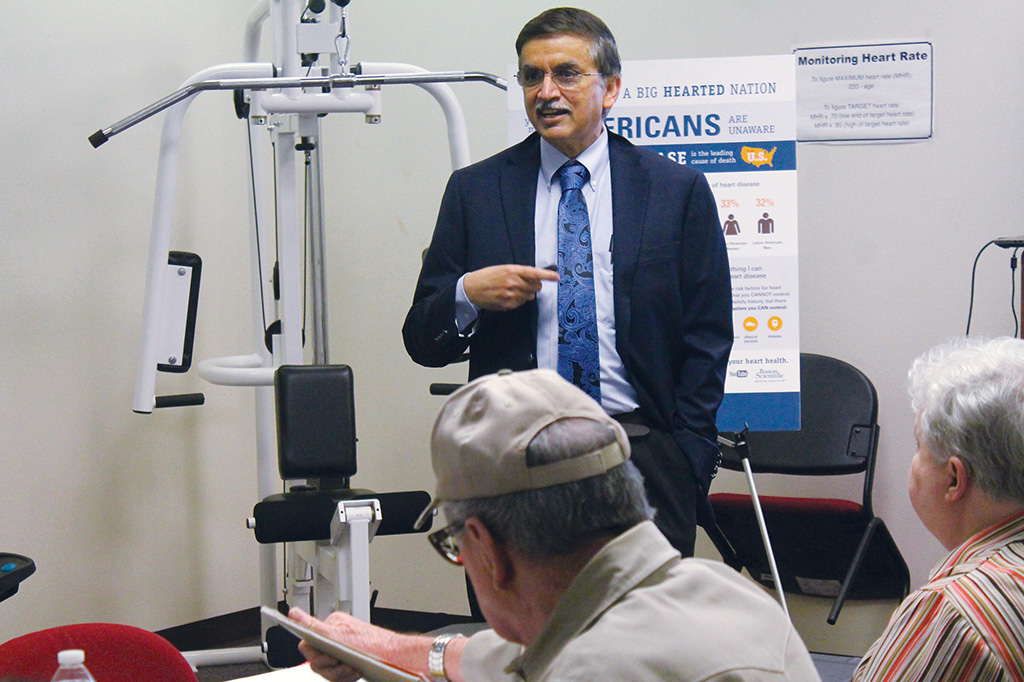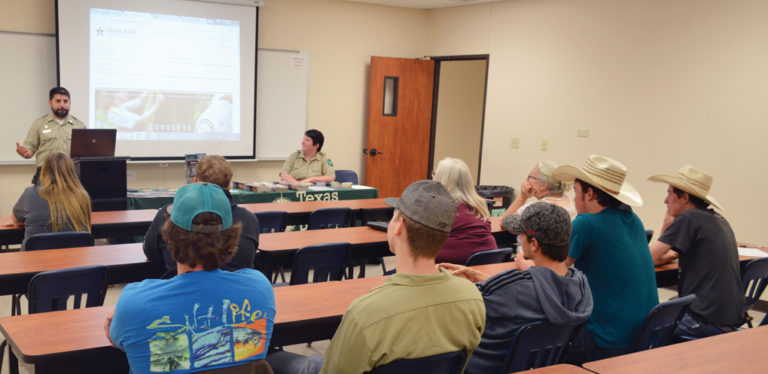The Heart of the Matter: CRCIL Hosts Heart Healthy Presentation

By Sarah Naron
Messenger Reporter
CROCKETT – In honor of American Heart Month, the Crockett Resource Center for Independent Living (CRCIL) hosted a presentation by Dr. Venkata R. Kovvali, M.D., of the Heart Institute of East Texas on Tuesday, Feb. 6.
Dr. Kovvali began his presentation by stressing the importance of identifying heart problems early after onset.
“When we start identifying problems before the heart is affected significantly, the quality of life and the longevity can increase significantly,” he pointed out. “So, the best thing is to diagnose problems at an early stage so that we can prevent future problems.”
Dr. Kovvali compared the human heart to a motor vehicle.
“It is a mechanical pump. It has got fuel injectors, and it has got a battery,” he explained. “When there’s a problem with the battery, then people may need a pacemaker. If the battery is firing too much, they may need a defibrillator to take care of the rapid heartbeat.”
In the event that problems are encountered with the “fuel pumps,” Dr. Kovvali said, doctors look to rectify the issues through means such as angiograms, balloons, bypasses and stints.
Dr. Kovvali discussed the most commonly experienced ailments related to the heart, such as angina – or chest pain – resulting from plaque buildup in the arteries of the heart.
“When the plaque builds up in those arteries, it will decrease the blood supply to the heart muscle,” he explained. “That will present as chest pain. It’s called angina.”
According to Dr. Kovvali, plaque which forms inside the chambers of the heart or neck arteries can travel to the brain, causing stroke and heart attack.
“If the heart arteries are blocked, they (a patient) gets a heart attack,” he said. “If the neck arteries are blocked, they get a stroke.”
Dr. Kovvali said the most efficient ways to prevent such occurrences include a healthy diet and exercise regimen, avoiding obesity and smoking, undergoing routine checks for diabetes and keeping existing cases of diabetes under control.
Dr. Kovvali also provided information regarding arrhythmias, issues with what he called the “electrical impulses” of the heart.
As Dr. Kovvali explained, “the heart keeps on giving impulses,” acting as “an automatic battery” from the time a person is still in the womb until the end of life.
“That impulse is conducted with these cables to both the left side and right side of the heart,” he said. “If there’s a problem with the cables, that’s when people pass out. They get a dizzy spell, and they pass out.”
According to Dr. Kovvali, issues such as arrhythmias can be detected by monitoring the heart.
“If any more than three seconds passes in the heart from beat to beat, they require a pacemaker,” said Dr. Kovvali.
Atrial fibrillation, Dr. Kovvali explained, occurs when multiple impulses are fired simultaneously in the chambers of the heart.
“When that happens, the upper chambers are not effectively contracting. They are just quivering without any effective contraction,” he said. “The lower chambers are contracting well.”
Dr. Kovvali said that patients with atrial fibrillation are at five times the risk for suffering a stroke.
“People with atrial fibrillation – depending upon their risk factors like high blood pressure, diabetes, or any previous stroke – they are supposed to be on blood thinners to prevent a stroke.”
Among the blood thinners on the market is the “age-old” drug warfarin, which is commonly marketed under the brand name of Coumadin.
“The biggest problem with warfarin is, every four weeks, you are going to the doctor to take a blood test to make sure you are taking the correct dose,” said Dr. Kovvali.
Dr. Kovvali added that patients taking warfarin are asked to refrain from consuming green, leafy vegetables, as doing so will cause the blood to thicken.
“But the new drugs – you’ve got Xarelto, Eliquis – all these drugs, you don’t have to monitor the blood thinning,” Dr. Kovvali said. “It (the dose) is once a day. Most insurance companies have approved these drugs.”
The new blood thinners, Dr. Kovvali said, can reduce the risk of suffering a stroke.
According to Dr. Kovvali, heart disease is a leading cause of death in America, and a reported 82 million people suffer some form of heart ailment.
“The heart of the matter is, we are to find out the risk factors of heart disease and then try to prevent is,” he said.
Risk factors for heart disease include conditions such as high blood pressure and diabetes, as well as a sedentary lifestyle.
Dr. Kovvali recommended visiting a doctor at least once per year to receive a blood pressure, blood sugar and cholesterol check.
“Make sure that you don’t get into the habit of smoking,” he added.
Dr. Kovvali cited a British study which indicates that smokers who kick the habit gain an extra 10 years to their estimated lifespan.
“If you quit smoking, in two years’ time, your risk (of heart disease) will come down to the nonsmoker’s level,” he said.
“I tell my patients that this is the only habit that if you quit, you keep the money,” he continued. “You don’t give it to the doctors.”
Sarah Naron may be reached via email at [email protected].






